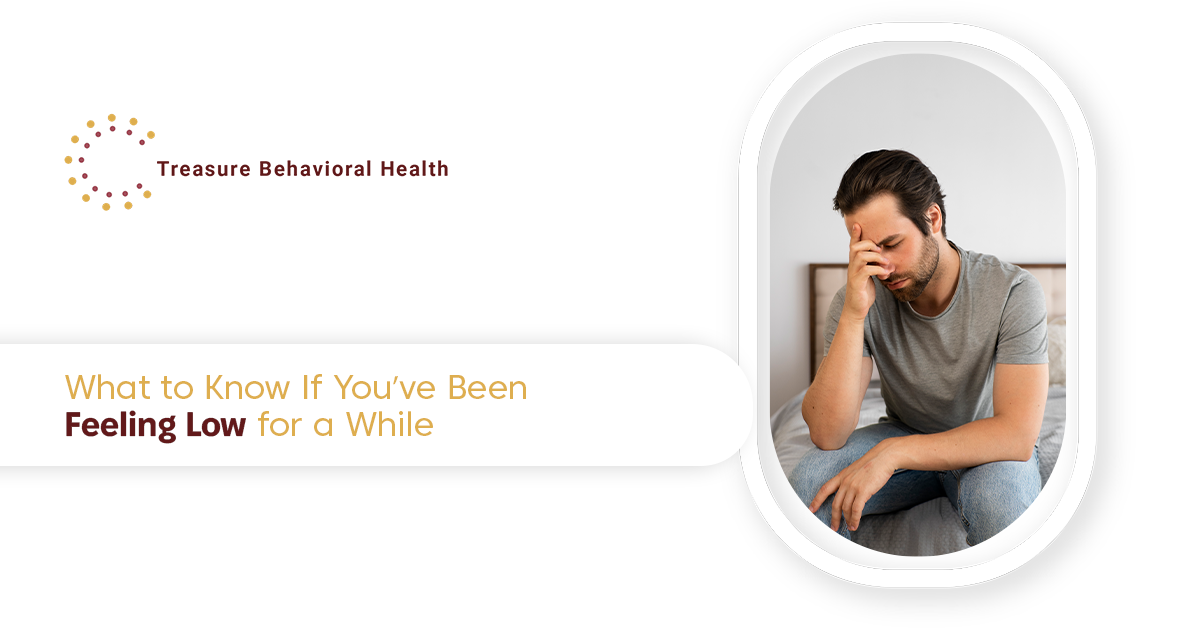Some days are more difficult than others for all of us.
However, when those days become weeks and months, you should listen to what your mind and body are trying to convey to you.
What you’re experiencing has a name, it’s common, and most importantly, it’s not permanent.
At Treasure Behavioral Health, we see this every day and know exactly how to help you feel like yourself again.
When Low Feelings Become Something More
What may begin as a bad patch may at times progress into something more.
Depression is a mood disorder that results in a continued feeling of sadness and loss of interest and might affect your daily functioning.
You might notice these:
- A lasting feeling of sadness that does not appear to go away
- No longer finding pleasure in the things that previously gave you happiness
- Tired despite getting sleep
- Trouble in focusing or decision making
- Appetite or sleep problems
- Hopelessness or worthlessness
These emotions might not be noticeable right away, and may be similar to a low rumble in the background of your life. Yet they need your care and attention.
What’s Behind It
The fact is, there is hardly ever only one factor why a person falls into depression.
Depression is not caused by a particular genetic alteration in a solitary gene, and your personal life experiences and the environment also have a role.
It is more of a confluence of factors coming into play.
Some elements include:
- Genetics – a history of depression in the family may put you at risk
- Life stressors such as loss of job, change in relationships, or health problems
- Even positive major life changes
- Some medications or health issues
- Seasonal changes or lack of sunlight
- History of trauma or difficult experiences
In a genetically depressive susceptible individual, any stress (a work deadline or a physical illness, to name a few) can then tip this system out of balance.
This is why depression may at times appear out of nowhere.
The Effects of Long-Term Low Moods
Depression can affect your whole being when it hangs around, not just your mood.
It is associated with higher health care expenditures and other medical ailments such as heart disease and diabetes.
It can affect your relationships with others, your working performance, and your physical condition, too.
And this is not to frighten you, but to stress that mental health is equally essential to physical health, which also needs to be taken care of.
The quicker you respond to feelings of constant low moods, the more prepared you will be not to allow them to worsen.
What Can Be Helpful
Here’s what can help.
- Talk to someone you feel you can really confide in—isolation can many times intensify depression
- Simple self-care practices can help. Bathing and brushing teeth should not be avoided, even when they seem hard
- See if you can get a little sunlight and easy movement every day
- Be accepting and kind to yourself
- Get professional treatment from a mental health specialist
Related:
Reconnecting With Yourself
And if you have been feeling down lately, do understand that this is not your fault, and this is not forever.
Depression can be treated very successfully, and there exist numerous methods of treatment.
It could be therapy and medication, motivational interviewing, lifestyle changes, or a combination of methods, but there is a way ahead that will suit you.
Get Professional Support at Treasure Behavioral Health
If you are reading this and you are contemplating whether it is time, then listen to that inner voice.
If you’re tired of feeling this way, Treasure Behavioral Health might be worth a call.
We work with people who’ve been carrying this weight for a while.
It doesn’t have to be like this. Sometimes, one conversation can end up shifting everything.
Make an appointment today.
Helpful Resources
If you need support right away:
- National Suicide Prevention Lifeline – 988 (call or text)
- Crisis Text Line – Text HOME to 741741
FAQ
How to make yourself feel better when you are at your lowest?
Get help whenever you can – this may be by calling a friend, family member or counselor on the phone. When having suicidal thoughts, please contact a crisis helpline.
Focus on basic self-care like:
- Eating
- Sleeping
- Drinking water
Remind yourself that those extreme feelings are temporary and treatable.
And what would happen with a long-term depression?
The untreated depression might grow complicated and aggravate and might affect physical health, relations, and the ability to perform daily tasks.
It may be a predisposing condition to other health issues and complicate recovery.
What is the #1 cause of depression?
Depression does not have one cause. The science says it is usually an interaction between genetic susceptibility and environment, and life stressors.


No comment